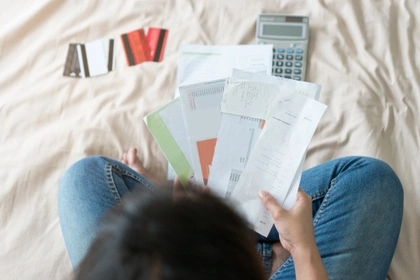How to pay off credit card debt
While credit card debt may seem overwhelming and unmanageable, every situation has a solution. Here’s five simple steps that can help you regain control:
1. Work out exactly what you owe
Add up your total debt, including any interest. List all your credit accounts with:
- Outstanding balances
- Interest rates
- Minimum monthly payments
This will help you see the bigger picture and calculate how much you need to cover your monthly minimum payments. If your budget is tight, focus on making at least these minimum payments to avoid further fees or damage to your credit score.
If possible, cut back on non-essential expenses to free up more money for your repayments. Even small sacrifices can make a big difference over time.
2. Prioritise high-interest debt
If you can afford to pay more than the minimum, focus on your highest-interest credit card debt first. This will save you the most money in the long run.
For example, if you’re paying £100 per month on your cards and you can afford an extra £20, put that toward the highest interest card.
However, remember to address priority debts (like rent, council tax, or energy bills) first, as missing these can have more immediate and severe consequences. For detailed advice on priority debts, visit Citizens Advice.
3. Explore alternative options
If your current credit card repayments are unmanageable, consider these alternatives:
- Balance transfer credit cards: These may offer low or 0% interest for an introductory period, giving you breathing space to pay down your debt faster. Be mindful of transfer fees and introductory terms.
- Debt consolidation loans: Combine multiple debts into one payment with potentially lower interest. However, weigh the risk of paying more in the long term and avoid taking on new debt while repaying the loan.
Many lenders provide an eligibility checker that won’t affect your credit score, so use these tools to explore your options risk-free.
4. Speak to your lender
Get in touch with your lender if you’re struggling to pay your card. Lenders deal with situations like this regularly and may offer solutions, such as:
- Freezing payments or interest rates
- Lowering your minimum repayment
Set up a priority system for getting on touch with lenders. Focus on either:
- the debts with the highest interest
- or the cards you owe the most to.
Approach your lenders with a clear understanding of your budget and priorities. Being proactive shows lenders you’re serious about resolving the issue, and they may be more willing to work with you.
5. Seek professional advice
There’s no need to face this alone. Free debt advice is available from UK charities such as:
These organisations can help you create a debt management plan or even talk to creditors on your behalf.
I’ve lost my job and can’t pay credit card bills
If you’ve recently lost your job, what once felt like manageable payments may now seem daunting. Here’s how to approach the situation:
- Check your insurance: If you have Short-Term Income Protection (STIP) or a similar policy, it may cover your credit card payments temporarily. Review your policy terms to see if you're eligible to claim.
- Contact your lender: Let them know about your job loss as soon as possible. Many lenders are sympathetic and may offer temporary relief, such as payment holidays or reduced payments.
- Get advice from debt charities: They can provide tailored support for your situation and help you focus on finding a new job without additional stress.
Persistent debt letters: What do they mean?
Receiving a persistent debt letter can be alarming, but it’s designed to help you. This happens if, over 18 months, you’ve paid more in fees and interest than the amount you originally borrowed.
To resolve persistent debt, try to increase your monthly payments. If this isn’t possible, contact your lender to explore alternative repayment plans.
Apps to help you manage your finances
Staying on top of your finances is easier nowadays thanks to easy access to a wide range of apps designed to simplify budgeting, track spending, and even save automatically.
We’ve delved into some of the most popular apps to help you get out of debt over on our blog, where we look at the likes of Emma, Plum and others. Using one or more of these apps can make managing your finances straightforward and even enjoyable, giving you greater clarity and control over your money.
Disclaimer: We make every effort to ensure content is correct when published. Information on this website doesn't constitute financial advice, and we aren't responsible for the content of any external sites.






